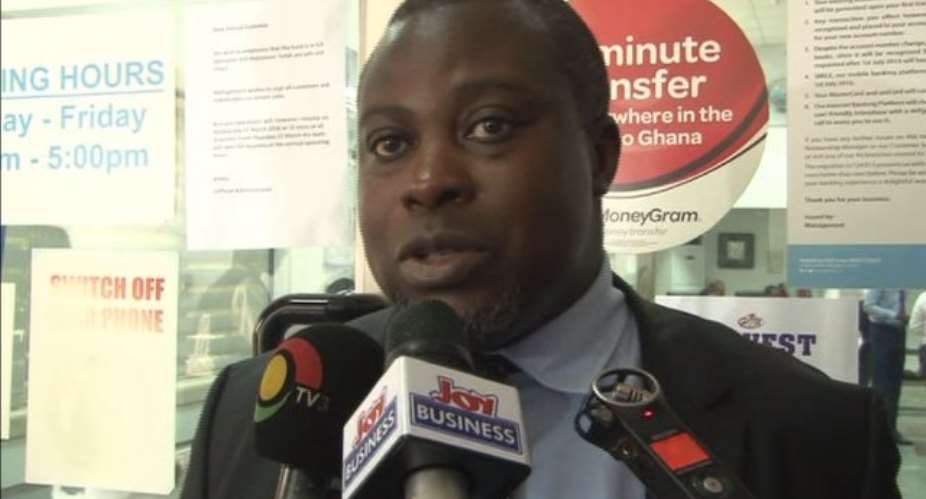International audit and accounting firm KPMG has assured that all assets of Unibank are in safe hands.
“The theme for this restructuring is saving the bank, and we as KPMG have done this in other parts of the world.
It is that strong credential that we bring to bear in doing a similar exercise in Ghana and we believe that successes that we have had elsewhere, those successes would be transferred into the project we are doing in Ghana,” Anthony Sarpong, Partner at KPMG told journalists on Wednesday.
KPMG was appointed by the Bank of Ghana as administrator of the indigenous bank on Tuesday.
It was a move to save Unibank from imminent collapse. The has resumed operations after a temporary shut down on Wednesday
This was to allow officials of KPMG appreciate the bank’s financial position after the takeover.
After a successful stock-taking exercise, banking halls opened for business at midday on Wednesday.
“All customers can go to their branches to transact business as usual and they will be served. It is business as usual and customers will have access to their funds,” Mr Sarpong said.
He said, “I want to take this opportunity to assure customers and all depositors that they can go to their branches to transact business as usual and they would be served.
Those who are using other channels like the ATM and online can also use those platforms to access their banks. We request that all bank stakeholders and our customers remain calm as normal operations have resumed,” Mr Sarpong.
KPMG has been tasked by the Central Bank to rehabilitate the “ailing” bank within the next six month.
BoG explains takeover of Unibank management
The appointment of the Official Administrator has, therefore, become necessary due to the fact that uniBank has, among other things:
a) Persistently maintained a capital adequacy ratio (CAR) below zero (currently negative 24%), making it technically insolvent. This contravenes section 29 of Act 930 which requires a minimum CAR of 10% to be maintained at all times.
b) Persistently suffered liquidity shortfalls and consistently breached its cash reserve requirement.
As a result, UniBank has relied extensively on liquidity support (over GHS 2.2 billion) from the Bank of Ghana over the past two years to meet its recurring liabilities.
Among other things, a key shareholder of the bank managed to obtain liquidity support from the Bank of Ghana using third-party banks as its agents.
The Bank of Ghana’s exposure to the bank was therefore underestimated by nearly GHS 400 million, as this amount was not reflected in its books.
c) Conducted its credit administration in a manner that has jeopardized the interests of depositors and the financial sector as a whole.
d) Failed to comply with a directive of the Bank of Ghana dated 26th October 2017 under section 105 of Act 930, prohibiting the bank from granting new loans and incurring new capital expenditures.
e) Failed to comply with several other regulatory requirements.





 There’s nothing you can do for us; just give us electricity to save our collapsi...
There’s nothing you can do for us; just give us electricity to save our collapsi...
 Ghanaian media failing in watchdog duties — Sulemana Braimah
Ghanaian media failing in watchdog duties — Sulemana Braimah
 On any scale, Mahama can't match Bawumia — NPP Youth Organiser
On any scale, Mahama can't match Bawumia — NPP Youth Organiser
 Never tag me as an NPP pastor; I'm 'pained' the 'Akyem Mafia' are still in charg...
Never tag me as an NPP pastor; I'm 'pained' the 'Akyem Mafia' are still in charg...
 Your refusal to dedicate a project to Atta Mills means you never loved him — Kok...
Your refusal to dedicate a project to Atta Mills means you never loved him — Kok...
 2024 elections: I'm competent, not just a dreamer; vote for me — Alan
2024 elections: I'm competent, not just a dreamer; vote for me — Alan
 2024 elections: Forget NPP, NDC; I've the Holy Spirit backing me and nothing wil...
2024 elections: Forget NPP, NDC; I've the Holy Spirit backing me and nothing wil...
 2024 elections: We've no trust in judiciary; we'll ensure ballots are well secur...
2024 elections: We've no trust in judiciary; we'll ensure ballots are well secur...
 Performance tracker: Fire MCEs, DCEs who document Mahama's projects; they're not...
Performance tracker: Fire MCEs, DCEs who document Mahama's projects; they're not...
 Train crash: Railway ministry shares footage of incident
Train crash: Railway ministry shares footage of incident
